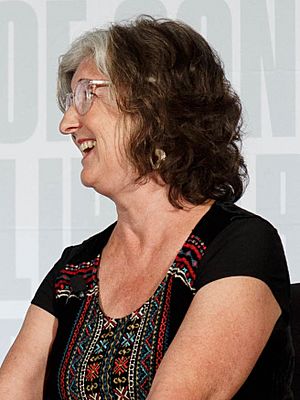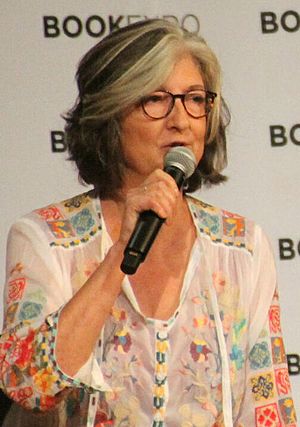Barbara Kingsolver facts for kids
Quick facts for kids
Barbara Kingsolver
|
|
|---|---|

Kingsolver at the 2019 National Book Festival
|
|
| Born | Barbara Ellen Kingsolver April 8, 1955 Annapolis, Maryland, U.S. |
| Occupation |
|
| Education | |
| Period | 1988–present |
| Genre | Historical fiction |
| Subject | Social justice, feminism, environmentalism |
| Notable works |
|
| Spouse |
|
| Children | 2 |
| Relatives | Wendell Roy Kingsolver (father), Virginia Lee (née Henry) Kingsolver (mother) |
Barbara Ellen Kingsolver (born April 8, 1955) is an American author who has won the famous Pulitzer Prize for Fiction. She writes novels, essays, and poems. People know her for books like The Poisonwood Bible, which is about a family that moves to the Congo in Africa. Another famous book is Animal, Vegetable, Miracle, a true story about her family's adventure in eating only local food for a year.
In 2023, she won the Pulitzer Prize for her novel Demon Copperhead. Her stories often explore important ideas like social justice (fairness for all people), biodiversity (the variety of life on Earth), and how people connect with their environment.
Kingsolver has won many awards for her writing. She is the only author to win the Women's Prize for Fiction two times. Every book she has written since 1993 has been a New York Times Best Seller.
She grew up in rural Kentucky and now lives in the Appalachia region of Virginia. Before becoming a novelist, she studied biology and worked as a science writer.
Contents
Early Life and Education
Barbara Kingsolver was born in 1955 in Annapolis, Maryland, but she grew up in the small town of Carlisle, Kentucky. When she was seven years old, her family moved to the Congo in Africa for a while. Her father was a doctor who worked there. This experience later inspired some of her writing.
After high school, Kingsolver went to DePauw University in Indiana. At first, she studied to be a classical piano player. But she soon realized there were very few jobs for pianists and switched her major to biology.
During college, she was active in protests against the Vietnam War. She graduated in 1977 and then lived in France for a year. Later, she went to the University of Arizona and earned a master's degree in ecology and evolutionary biology.
Personal Life
In 1985, Kingsolver married Joseph Hoffmann, and they had a daughter named Camille. In 1994, she married Steven Lee Hopp, who studies birds. They had a daughter named Lily.
In 2004, Kingsolver and her family moved to a farm in Washington County, Virginia. This move led to one of her most famous nonfiction books.
For a time, Kingsolver was part of a rock band called the Rock Bottom Remainders. The band was made up of famous writers, including Amy Tan, Matt Groening, and Stephen King. Kingsolver played the keyboard.
Writing Career
Kingsolver started her career by writing about science for the University of Arizona. She then began writing articles for newspapers and magazines. She decided to write fiction after winning a short-story contest.
Famous Novels
Her first novel, The Bean Trees, was published in 1988. She wrote it at night while she was pregnant and had trouble sleeping. The book is about a young woman who drives from Kentucky to Arizona and adopts a child she finds along the way.
The Poisonwood Bible (1998) is one of her most celebrated books. It tells the story of a missionary's wife and daughters living in the Congo. The book was a finalist for the Pulitzer Prize.
In 2000, she published Prodigal Summer, a novel set in the Appalachian Mountains. That same year, President Bill Clinton awarded her the National Humanities Medal.
Nonfiction and Later Work
In 2007, Kingsolver published Animal, Vegetable, Miracle. The book describes the year her family spent trying to eat only food that was grown locally. They grew their own vegetables, raised animals, and made their own cheese on their Virginia farm. The book won a James Beard Foundation Award for food writing.
Her 2012 novel, Flight Behavior, is about how climate change affects the beautiful monarch butterfly.
Her 2022 novel, Demon Copperhead, was inspired by the classic book David Copperfield. It is set in Appalachia and explores the problems caused by the misuse of strong pain medicines in the region. The book was a huge success and won the 2023 Pulitzer Prize for Fiction.
What Makes Her Writing Special?
Kingsolver often writes about places she knows well, like Central Africa, Arizona, and Appalachia. While her stories are not exactly about her own life, she uses her experiences to make them feel real.
Her books often focus on characters who are fighting for fairness and equality. She writes about the challenges faced by poor families and single mothers. Other important themes in her work include finding a balance between being an individual and being part of a community. She also explores the connection between people and the natural world.
Many readers enjoy how she uses stories to teach about history and science in an interesting way.
The Bellwether Prize
In 2000, Kingsolver started the Bellwether Prize. This award is for a new American writer whose unpublished novel is about social justice. The prize includes $25,000 and help with getting the book published. Kingsolver created the prize to encourage authors to write stories that imagine a better and more fair world.
Major Awards
Barbara Kingsolver has won many honors for her work. Here are some of the most important ones:
- The Poisonwood Bible (1998): Was a finalist for the Pulitzer Prize and the PEN/Faulkner Award.
- National Humanities Medal (2000): A special honor given by the U.S. President.
- Animal, Vegetable, Miracle (2007): Won the James Beard Foundation Award for food writing.
- The Lacuna (2009): Won the Women's Prize for Fiction in 2010.
- Dayton Literary Peace Prize (2011): Received a special award for her achievements.
- Demon Copperhead (2022): Won the Pulitzer Prize for Fiction and the Women's Prize for Fiction in 2023. This made her the first author to win the Women's Prize twice.
List of Works
Fiction
- The Bean Trees (1988)
- Homeland and Other Stories (1989)
- Animal Dreams (1990)
- Pigs in Heaven (1993)
- The Poisonwood Bible (1998)
- Prodigal Summer (2000)
- The Lacuna (2009)
- Flight Behavior (2012)
- Unsheltered (2018)
- Demon Copperhead (2022)
Essays
- High Tide in Tucson: Essays from Now or Never (1995)
- Small Wonder: Essays (2002)
Poetry
- Another America (1992)
- How to Fly (In Ten Thousand Easy Lessons) (2020)
Nonfiction
- Holding the Line: Women in the Great Arizona Mine Strike of 1983 (1989)
- Last Stand: America's Virgin Lands (2002)
- Animal, Vegetable, Miracle: A Year of Food Life (2007)
 | Leon Lynch |
 | Milton P. Webster |
 | Ferdinand Smith |


